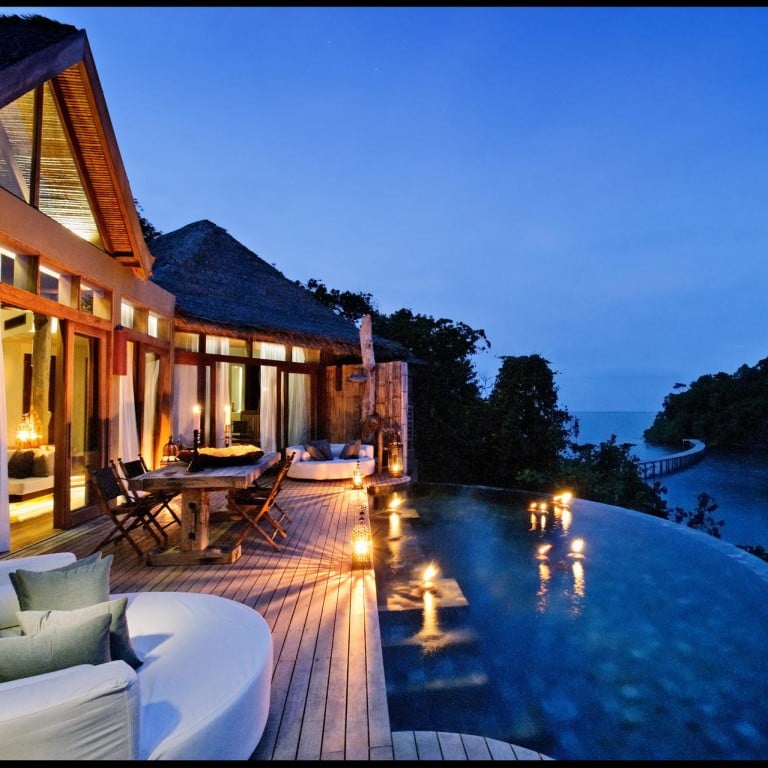
Eco-chic Cambodian resort balances luxury and social responsibility
Rory and Melita Hunter see developing luxury hotels, like their villas at Song Saa on an island in the Koh Rong archipelago, as a platform to drive conservation and community work
Rory Hunter knew he had stumbled upon something special when he and his wife Melita landed on the shores of the remote and untouched islands of the Koh Rong archipelago a few kilometres off mainland Cambodia. It was 2005 and the Australian couple had moved to Cambodia to start a 12-month adventure. They ended up staying 10 years - and they bought an island.
"I was working for Saatchi & Saatchi and accepted a transfer to Cambodia to spend a year setting up an office there before going to New York. My wife and I thought it would be a fun adventure, and we were in our 20s," says Rory, who is now based in Hong Kong.
"As an entrepreneur I saw opportunity everywhere. It's a new country awakening from a troubled past. The Cambodian people were ready to get on with life: the government made some key changes to the constitution so there would be more political stability and the economy was growing. There was an air of 'anything is possible'."
With that in mind the Hunters went on to found award-winning Song Saa Private Island Resort. Opened in 2011, it was the country's first island resort. But it was no ordinary resort. Hunter wanted the highest levels of conservation and community development so he made it his mission to follow the mantra "luxury that treads lightly" - the protection of the environment and the support of local communities is central to Song Saa's ethical charter.


What they did was turn it into an eco-luxe escape. The Hunters' built 27 villas made from earthy stone and polished marble walls with thatched roofs, all with ocean views and private pools. Driftwood and recycled timber from old and discarded Cambodian fishing boats have been incorporated into villa furniture and construction. As for the food, the focus is on fresh, sustainable and locally produced fare.
"The more time we spent in the country, the more we saw the negative impacts on the environment and the challenges these communities faced. We realised that we had an important role to play: the public sector lacked the resources, so the responsibility falls to the private sector to take charge. With all these problems, we wanted to work as a positive community member.
"You can't have ultra luxury next to ultra poverty and not have it interact at a philosophical and design level - it would feel polarised. Guests would feel guilty and the locals resentful, so working closely with everyone, this meant our guests were engaged and they can feel enriched by the work being done by our foundation and resort - it seemed the most logical thing to do."
Armed with a strong green message, the couple set up a foundation to protect the surrounding Koh Rong archipelago - 23 islands covered in rainforest and surrounded by coral reefs. They also set up Cambodia's first marine reserve and implemented the region's first solid-waste management centre as well as community projects focusing on conservation, education and health care.
We see the hotel as a pebble which you throw in the water, and the foundation is the ripple that reaches the local community
But a health scare almost ended their plan.
"Originally, we planned to develop the hotel and allow another hotel brand to run it. We spent three years pulling all that together but towards the end of 2008, just as the global financial crisis hit, Melita was diagnosed with cancer. We had to throw everything in the bin, and get on the first plane back to Australia. Six months later she was given the green light from doctors and, against advice from friends and family, we gave the island project another go. This time we became both the developer and operator, and this is how Song Saa was born.
"I never thought I'd be a hotelier. The aspirations were to do something interesting and have a positive impact. I've always believed that a business should have a social mission and that businesses are the solution, not the problem," says Hunter, who was recently selected by the World Economic Forum as a 2015 Young Global Leader (YGL).

Now Hunter is focusing on expanding within Cambodia and emerging destinations such as Myanmar, Indonesia and Sri Lanka. Song Saa's familiar fingerprint - protecting fragile environments and enforcing social responsibility - will also be adhered to, as will the world-class luxury.
"Travellers are looking for interesting experiences and having a meaningful impact without leaving the trappings of luxury behind. To develop these luxury hotels, we see it as a platform to drive conservation and community work.
"We see the hotel as a pebble which you throw in the water, and the foundation is the ripple that reaches the local community."

